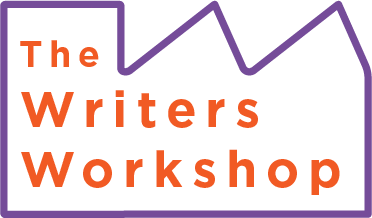I’m not a writer, but …
At The Writers Workshop, we meet many people who are starting out on their creative-writing journeys, and it gives us great pleasure to offer ways to help them step into their new identity as ‘a writer’. We hoped that our recent Write More in ‘24 Writers Day would attract some people who are new to creative writing, and we did! In this post, attendee Dr Becky Parry tells us about her experience of the event, as someone who doesn’t consider herself a writer, and what she came away with.
Dr Becky Parry (lower left of image) enjoying meeting other writers at Write More in ‘24
I’m not a writer, but …
I’m not a writer, but I found myself at the Writers Workshop’s ‘Write More in '24’ event on a grey Saturday with a new pen and notebook, ready to out myself as someone interested in writing.
I don’t consider myself a writer, despite being published multiple times. My books, articles and reports don’t count – no, really, they don’t. They are weird academic, peer-reviewed publications of research articles that not even my own family will read! All the time I was writing them, I wrangled with the conventions, always writing narrative and always drawing on experience. This definitely didn’t help my academic career, but it forced me to admit to myself that I want to write, not just because I have something to say but also because I love to write. And so, to the Writers Day I went.
The choice of sessions at Write More in ’24 had me asking myself what sort of writer I wanted to be. Surrounded by the throng of other self-proclaimed writers, I felt unsure, introducing myself as ‘not a writer,’ at every opportunity. Therefore, the first session was a perfect way to start the day. Writing from Life, with Raquel Vogl, cocooned me in the safety of short, timed writing exercises, focusing on specific details, and I quickly found myself falling into the ‘vortex of writing’ (a phrase from sci-fi writer Ursula K Le Guin), desperate for no interruptions and a few more minutes.
I’m not a writer, but I was forced (gently) to imagine myself writing for an audience in Anna Caig’s session, Finding Your Readers. But the session skillfully encouraged us to scrutinise who we were writing for. (And a note to the naysayers, I would add, that if momentary existential crisis did not ensue, then you were not doing it right.) Anna brilliantly prompted reflective, critical thinking in ways that offer affirmation, and she gave practical guidance for navigating online social spaces purposefully and ethically. I even managed to ask a question, making public what I want to write about for the first time.
I’m not a writer, but I am accustomed to rejection. After leaving my academic job, I applied for ridiculous numbers of jobs and found I have a robust and complete set of armour. What? The world does not want or need a menopausal, middle-aged, white, straight, neurotypical, AFAB woman? ‘Well, that’s the world’s fault,’ I found myself able to say … mostly. All the same, I found Amanda’s more psychological and personal approach to rejection extremely helpful. Amanda outlined contemporary theories about the brain to help us reconsider our own emotional reactions to rejection. I think it’s healthy to assume that there are many better writers than me and that structural inequality is the main barrier to success for most of us, but still I found Amanda’s acute observations about her ‘helpful’ friends and family highly resonant. If I am going to write for readers, I will encounter rejection. I’m ready.
From the session on rejection, I went to Lorna Partington’s session on self-editing. I am not a writer, but I felt that I knew quite a lot about editing and thought that the ‘self-editing’ would be well within my comfort zone. Turns out I know very little about editing, and this session blew my mind. Lorna encouraged us to think about the big picture and how the journey of the characters works for the readers. Also, it turns out that all this time I’ve been in a rabbit-hole of redrafting paragraphs, sentences, and words and ignoring the big issues, like structure, story and plot! As a reader (or listener of podcasts), I think the best nonfiction has a compelling story structure that supports character development, offering delicious clues and cues. Lorna’s advice about the first rule of editing, to take the scissors to the structure, will be good for me. As a queen of digression and exposition, I recognise that less is often more, but am having to unlearn some bad habits.
Perhaps one of those bad habits is continuing to insist I’m not a writer! I still defend my decision to resist describing myself as such on most occasions, but thanks to the Writers Day, I have been inspired to write more in 2024.
Dr Becky Parry is an independent researcher and writer who specialises in arts education and evaluation and currently works as an associate for Chol and Children’s Capital of Culture. Becky is also a passionate advocate for children’s films and film education and a board member of the European Children’s Film Association. Her book, Children, Film and Literacy, was published by Palgrave Macmillan; key findings were presented in animated form by artist Louis Cochrane.

